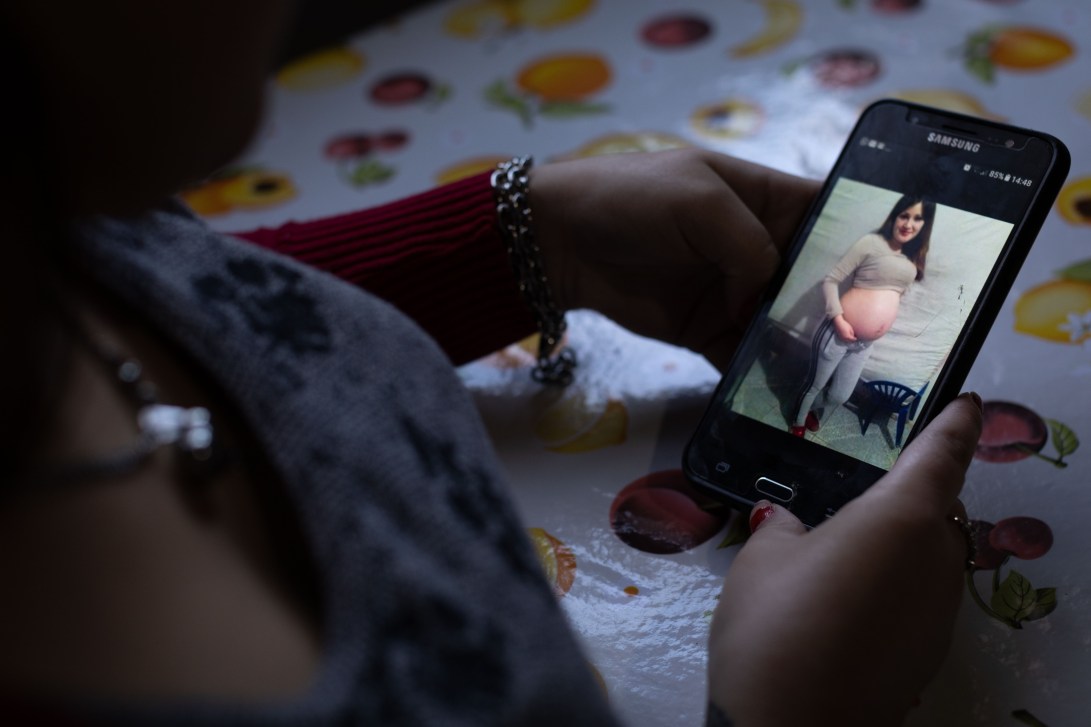
November’s featured photographer is Ángela Ponce
Ángela Ponce is an independent documentary photographer and photojournalist based in Peru. She focuses on long-term projects that approach Latin American social issues, political conflicts, disability rights and memory. During 2019, she was awarded; 2nd place in POY LATAM category Sports Series; Women Photograph and The Women’s Equality Center grant, among others. In 2018, she won the ICRC Humanitarian Visa d’Or (France). Currently she is a contributor for The New York Times and her work has been published in Bloomberg, BBC, Getty images, Harper’s Bazaar, El Pais, La Croix, RFI, Estempore, The Objective and Aljazeera.
Madres Adolescentes (Teenage Mothers)
Latin America and the Caribbean has the second highest rate of adolescent pregnancies in the world. Especially in Argentina, 14% of births are of women under 19 years of age. A recent report by the United Nations warns that teenage pregnancies are symptoms of inequality and poverty, although, there are cases in which some teenagers do plan to have children at an early age. The majority of the cases are due to lack of information and access to contraceptive methods than for the wish of motherhood itself.
Per day, 300 adolescents under the age of 19 become mothers in Argentina. As a result, maternal and infant mortality is rather high in the nation, due to complications during pregnancy and childbirth, which are also the second cause of death among girls worldwide. Many teenagers who become pregnant are forced to drop out of school, to take care of their children or to get a job. Consequently, an adolescent with little or no education has fewer opportunities to find a job. This project focuses on the stories of girls who became mothers at a young age in Argentina. Ángela’s aim is to call for reflection on adolescent pregnancy, show that the lack of information, access to contraceptive methods and rights can affect women from a young age.
*This is a project funded by The Women’s Equality Center and Women Photograph, and continues to be in progress.

After Leonela denounced her mother for mistreatment with the police, Leonela escaped from her family home to live with her boyfriend – when she was 14 years old – soon after she got pregnant. Her partner started to use drugs and became violent, for that reason Leonela had to leave their home and asked for help to the adolescent protection service in the city. Now Leonela lives with her son Isais in a shelter for teenage mothers in Buenos Aires, Argentina where she can remain until she turns 21 years old. Today, she works at a call centre during the day and in the evenings she attends night school to finish her secondary school.





Jenifer lives in Villa Fiorito, this is a well-known neighbourhood in Buenos Aires for being the cradle of football player Diego Maradona. In the Villa many families do not have basic services and survive as collecting recycling goods. Jenifer knows her daughter’s father, they met at a football match in her “barrio”. Soon after she got pregnant when she was 12 years old. Jenifer had to drop out of school and hopes to return doing night schooling. She is currently unemployed since she is underage. Luckily, Jenifer’s parents are able to support her and daughter Alyson, four years old, until she returns to education.


“When I found out about my pregnancy I told Alyson’s dad, but he did not take care of it, he just disappeared. I was very scared and could not tell anyone in my house until I was five months pregnant. Nobody noticed it at home or school because my belly was very small”.


“Being a young mother is a difficult experience, and more, if you are alone”.
To see more of Ángela’s work, here
La fotógrafa del mes de Noviembre es Ángela Ponce
Ángela Ponce es una fotógrafa documentalista independiente y fotoperiodista con base en Perú. Principalmente se enfoca en proyectos a largo plazo que abordan temas sociales como; conflictos políticos, derechos y memoria en Latinoamerica. Ángela ganó la Visa de Oro Humanitaria del CICR (2018). Este año recibió el 2do lugar en la categoría de Deportes del POY LATAM, y, fue becada por Women’s Photograph y The Women’s Equality Center para desarrollar su proyecto de Madres Adolescentes. Actualmente es contribuidora para The New York Times y su trabajo ha sido publicado en medios como; Bloomberg, BBC, Getty images, Harper’s Bazaar, El País, La Croix, RFI, Estempore, The Objective y Aljazeera.
Madres Adolescentes
América Latina y el Caribe tienen la segunda tasa más alta de embarazos adolescentes en el mundo. Especialmente en Argentina, el 14% de los nacimientos son de mujeres menores de 19 años. Un informe reciente de las Naciones Unidas advierte que los embarazos adolescentes son síntomas de desigualdad y pobreza, aunque existen casos en los que algunos adolescentes planean tener hijos, la mayoría se debe a la falta de información y acceso a métodos anticonceptivos que por el deseo mismo.
Por día, 300 adolescentes menores de 19 años se convierten en madres en Argentina. Este sigue siendo uno de los principales factores que contribuyen a la mortalidad materna e infantil en la nación suramericana, las complicaciones durante el embarazo y el parto son la segunda causa de muerte de las niñas en todo el mundo. Muchas adolescentes que quedan embarazadas se ven obligadas a abandonar sus estudios para cuidar de sus hijos o conseguir un empleo. Como consecuencia, adolescentes con poca o ninguna educación tienen menos oportunidades de encontrar un trabajo que no esté en condiciones informales o precarias. Madres Adolescentes son historias de jóvenes que son madres en Argentina. El objetivo del proyecto es llamar a la reflexión sobre el embarazo adolescente, mostrar cómo la desigualdad de género y la falta de oportunidades impactan a las mujeres argentinas desde una temprana edad.
Para saber de los proyectos de Ángela, aquí
